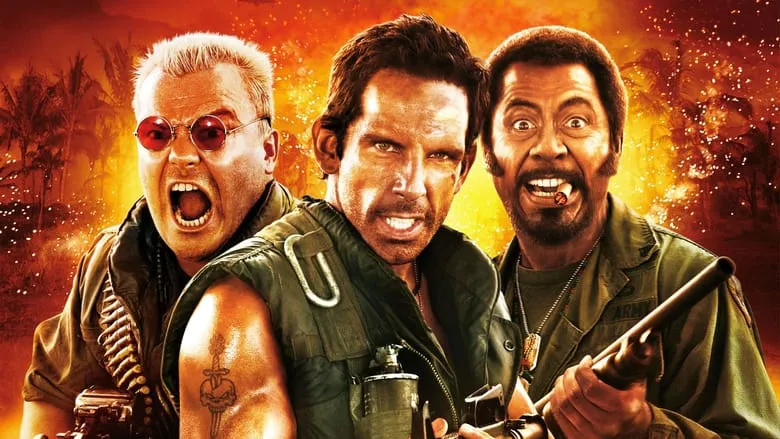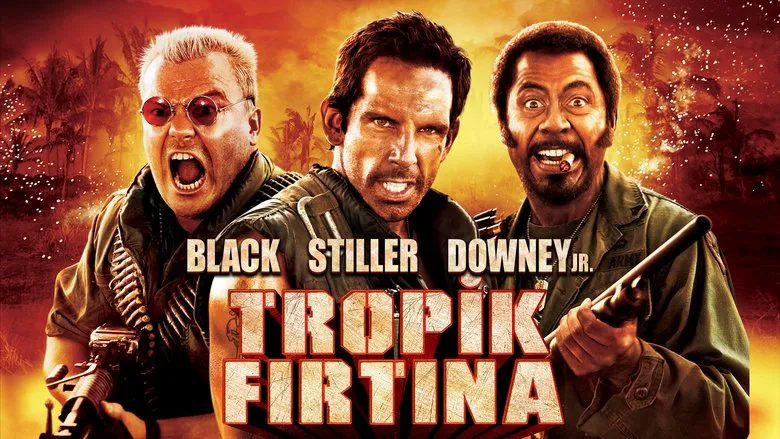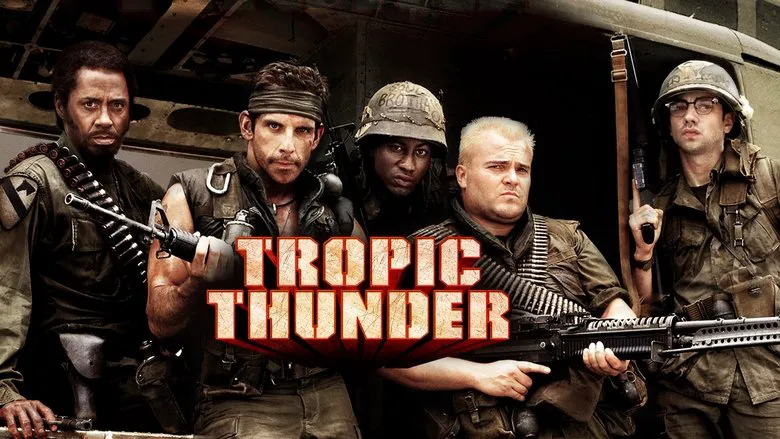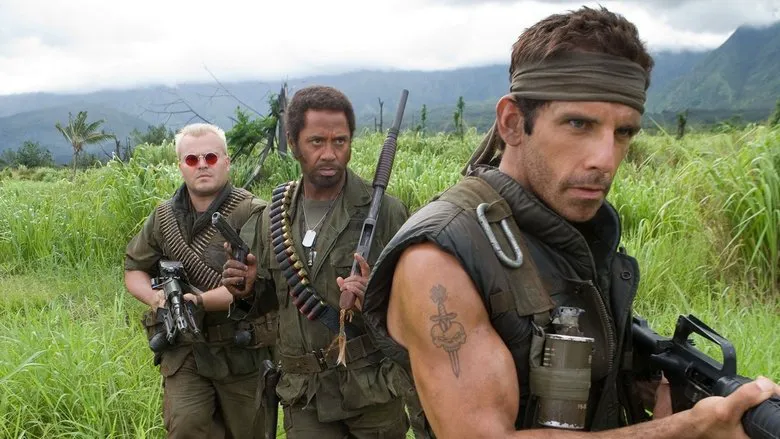Tropic Thunder: A Masterpiece of Absurd Satire on Hollywood
One might ponder upon “Tropic Thunder” (2008) as the fantastical outcome of a fever dream shared by a late-night cinema usher. Conceived by the ingenious minds of Ben Stiller, Justin Theroux, and a co-screenwriter (curiously sharing a name with Ethan Coen), this comedic tour de force surprisingly reveals an underlying satirical thread that connects the zany fashion world parody of “Zoolander” (2001) with the surreal, nightmarish Hollywood allegory of “Barton Fink” (1991). It stands not just as a comedy but as a hilarious, profound dissection of cinematic hubris.

A Film Within a Film: Reality Unravels on Set
The ambitious adaptation of the acclaimed Vietnam War bestseller, “Tropic Thunder,” is plagued by catastrophic production issues from the outset. The star-studded cast consists of a trio of colossal egos: Tugg Speedman (Ben Stiller), a fading action hero desperate for an Oscar-worthy role; Jeff Portnoy (Jack Black), a comedic actor known for his gross-out comedies, now battling a serious drug addiction; and Kirk Lazarus (Robert Downey Jr.), a five-time Academy Award winner whose method acting knows no bounds, even extending to controversial ‘pigmentation alteration’ for his role as a Black character.
Their colossal inability to cooperate, combined with a pyrotechnics expert’s accidental explosions sparking off environmental protests, pushes the film’s director, Damien Cockburn (Steve Coogan), to the brink of a complete mental breakdown. With the ruthless, maniacal producer Les Grossman (Tom Cruise in a memorable, unexpected role) breathing down their necks, the desperate situation calls for a radical solution. The book’s grizzled, armless author, “Four Leaf” Tayback (Nick Nolte), proposes a hazardous plan: drop the actors into the actual jungle, rig the area with hidden cameras, and secretly film a gritty, reality-style war movie.
Upon entering the dense jungle, the oblivious actors fully immerse themselves in their roles, unaware that an unexploded landmine and a heavily armed, notoriously ruthless drug cartel – led by the menacing but comical Fonz (Brandon T. Jackson) – have their own grievances with the intrusion. What began as a staged war film quickly transforms into a real, life-threatening combat zone, blurring the lines between acting and survival in the most ludicrous ways imaginable.

Robert Downey Jr.'s Unforgettable, Boundary-Pushing Performance
Among the many highlights, the fake movie trailers that precede “Tropic Thunder” are an absolute riot and reason enough to venture into this film. They perfectly set the stage for the kind of satirical genius that unfolds, especially a particular line delivered by Downey Jr.'s character: “Lord, forgive me, for I am about to… sin!” Robert Downey Jr., fresh off a sensational year with “Iron Man” (2008), delivers a performance that transcends typical parody.
His portrayal of Kirk Lazarus, the Oscar-winning method actor pushed to extreme lengths – including plastic surgery to portray an African American soldier – is a daring and brilliant critique of ego-driven Hollywood in general, and method acting in particular. Witnessing this motley crew of flamboyant personalities, decked out in camouflage, stumbling through the jungle to the rhythmic pulse of Creedence Clearwater Revival’s “Run Through the Jungle” is, arguably, a more memorable and uniquely absurd experience than even the esteemed “Platoon” (1986). While the annals of cinema hold many great Vietnam War movies, Stiller’s irreverent, Coen-esque creation truly stands in a league of its own.

A Masterclass in Absurdity and Incisive Satire
At its core, “Tropic Thunder” functions as “Barton Fink” wildly ramped up to an extreme, gloriously obscene degree. Everything within this cinematic landscape is deliberately artificial, hilariously absurd, and magnificently idiotic. The jungle bandits, for instance, are comically obsessed with a ridiculous Hollywood B-movie, while the actors themselves are eccentrically endearing in their profound cluelessness. Hollywood, in Stiller’s gaze, is unreservedly depicted as a chaotic “devil’s playground” – a place where vanity, greed, and delusion breed the most outlandish scenarios.
Audiences are given absolute permission to laugh freely and heartily because, much like in the Coen brothers’ distinctive filmography, this world appears to be precariously held together by little more than duct tape, constantly teetering on the verge of total collapse. This precarious, almost catastrophic reality is precisely what makes “Tropic Thunder” genuinely, riotously funny.
The Singularly Devilish Producer: Les Grossman
Beneath and behind the relentless barrage of slapstick humor and sharp wit lies the pivotal, albeit confined to Los Angeles, presence of the foul-mouthed, utterly terrifying producer. This infernal creature, a grotesque caricature made unforgettable by Tom Cruise’s chameleon-like transformation, embodies the very essence of a Coen brothers’ villain – despicable, yet spellbindingly compelling. His triumphant, grotesque victory dance at the film’s conclusion is simultaneously one of the most hysterically funny and profoundly disturbing moments in the entire movie, perfectly encapsulating the film’s satirical bite. (Crucially, be sure to remain seated for the post-credits scenes; they offer additional shocks and laughs that are not to be missed.)
Addressing Controversy and Delivering Uncommon Brilliance
“Tropic Thunder” did not escape its share of controversy, notably facing criticism for perceived mockery of people with disabilities through some of its more provocative jokes. While the specifics of that debate remain for legal and critical scholars to disentangle, it is imperative to recognize that “Tropic Thunder,” quite possibly the best comedy to emerge that year, is simultaneously a scathing, audacious “lawsuit” against the inherent ludicrousness of the modern universe itself.
It fearlessly takes aim at the pretentious veil of “good taste” and boldly challenges the pervasive, grand deception that is often peddled as “cinema.” But to whom, one might ask, should these legal papers of indictment be served? Perhaps to Hollywood itself, for its endless well of human folly and pretense that so brilliantly fuels this cinematic gem.
